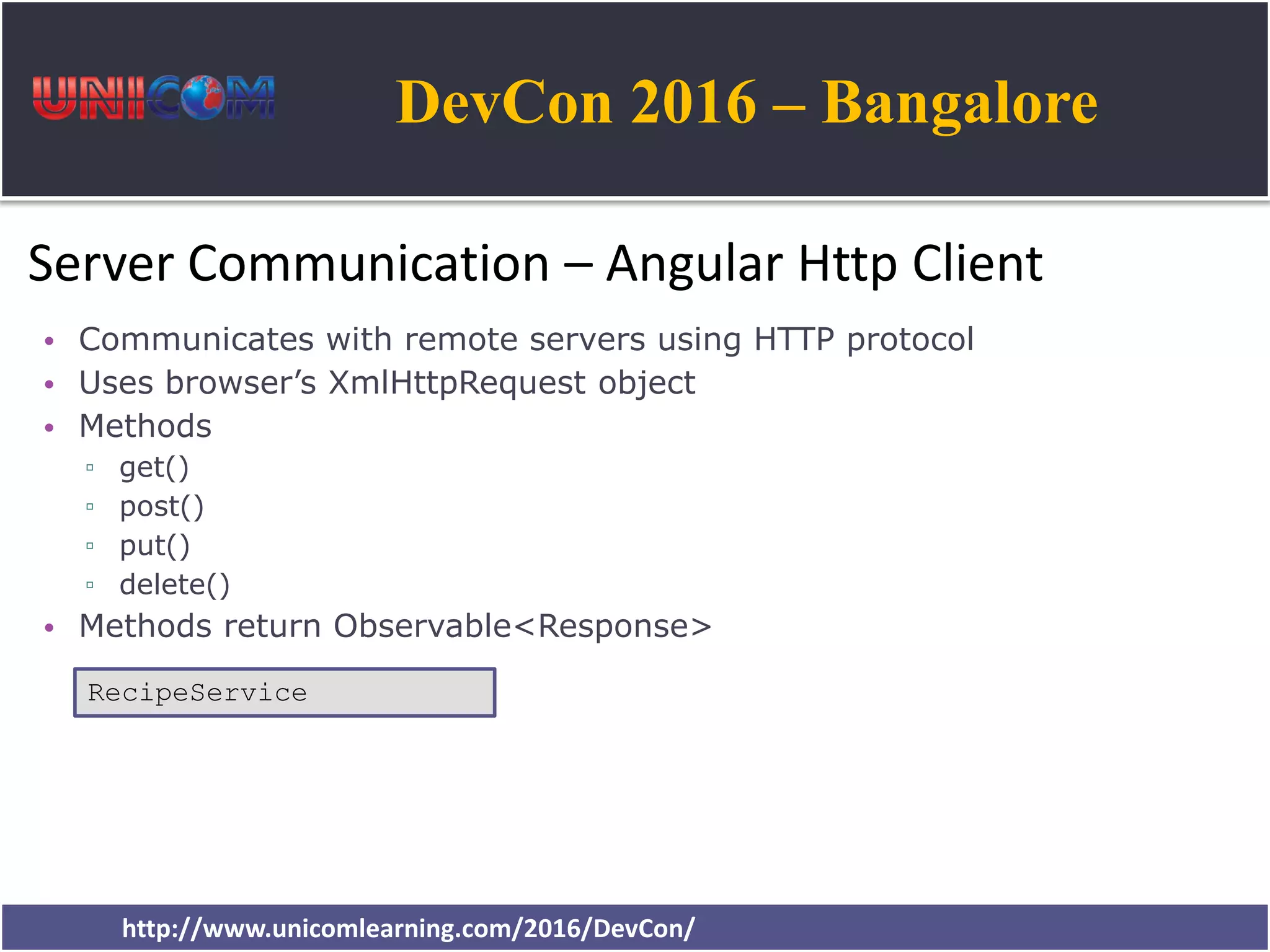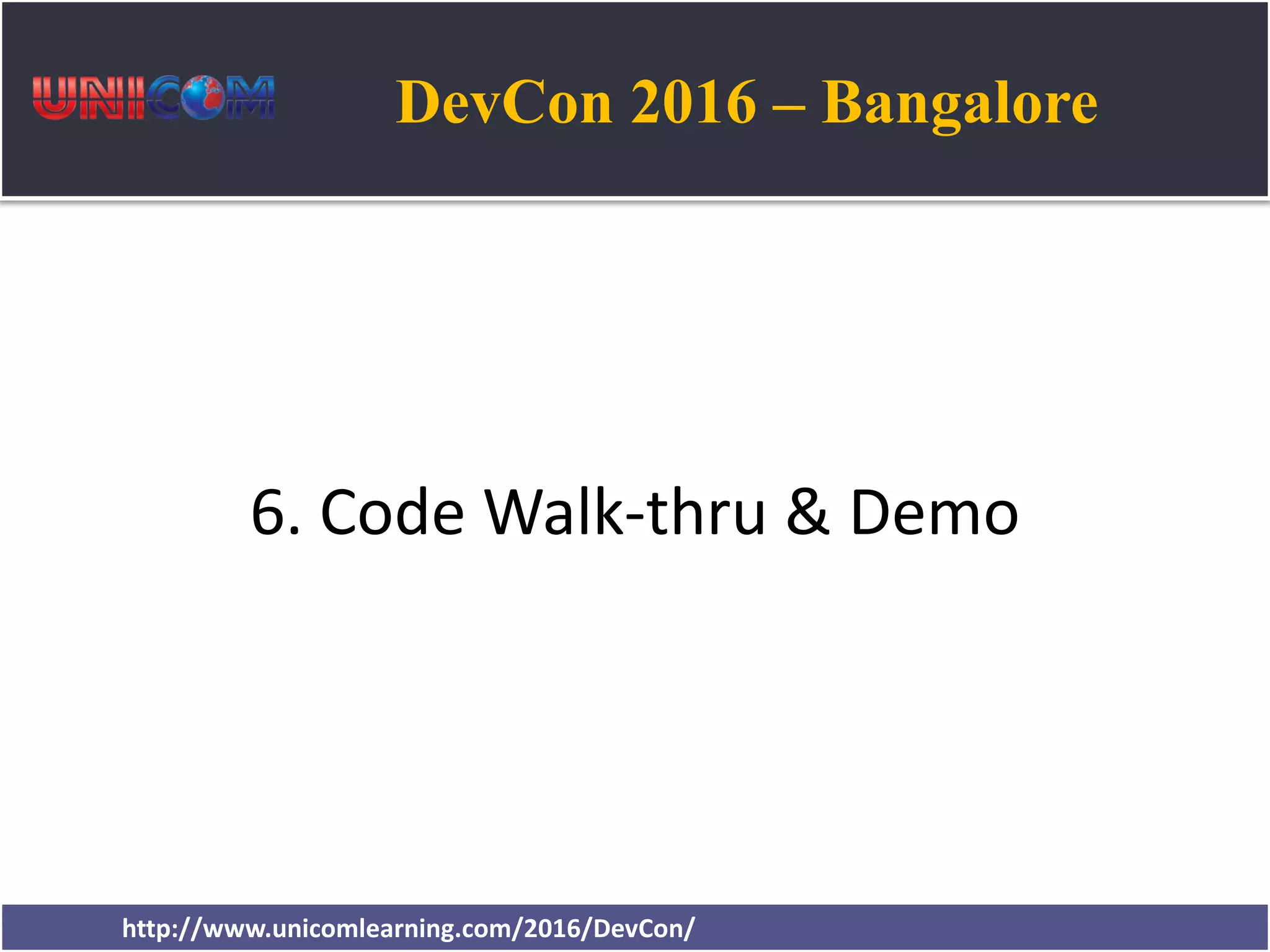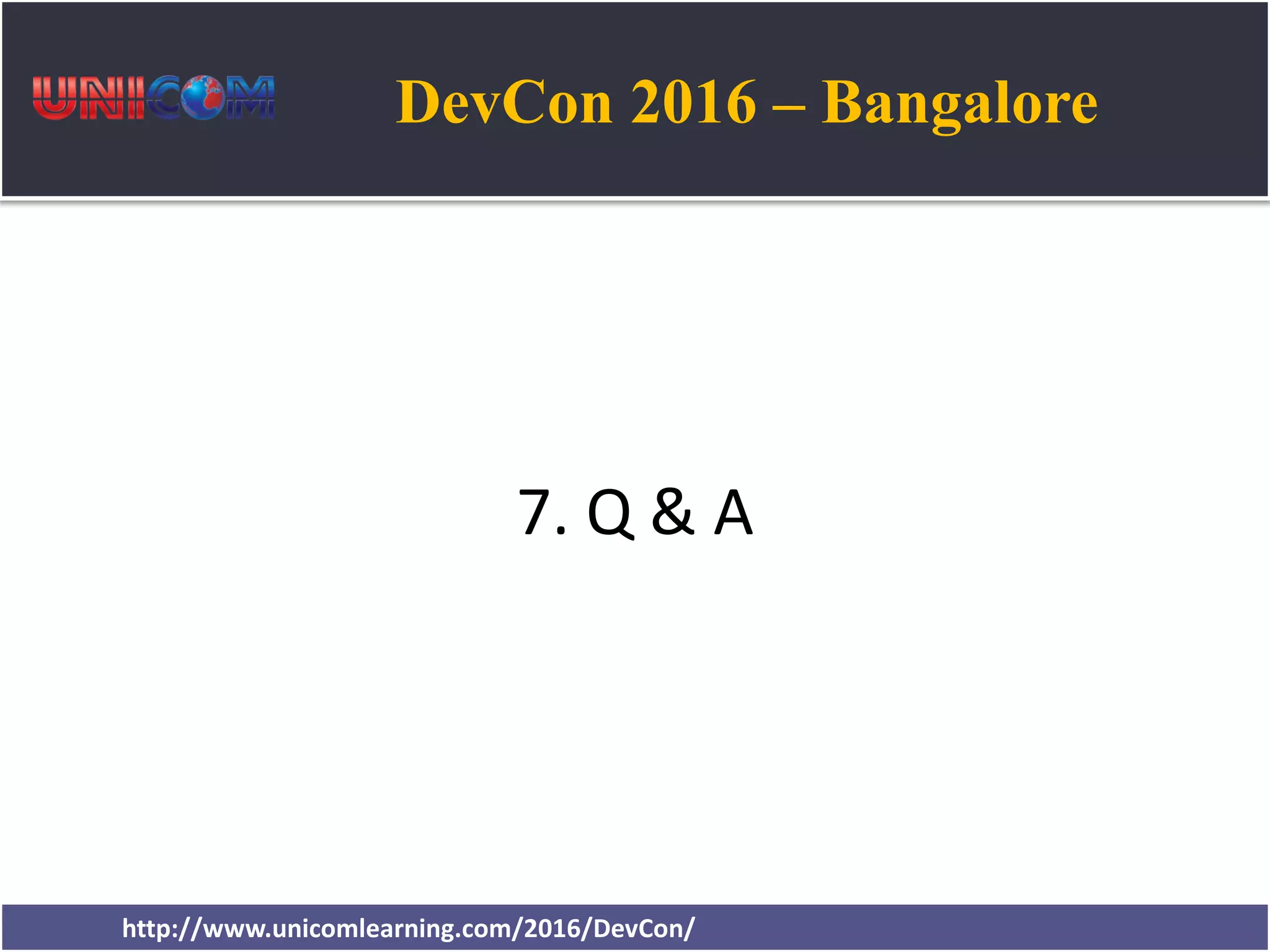The document provides an overview of a presentation by Naveen Pete at DevCon 2016 in Bangalore covering Angular 2, its benefits, and essential concepts like TypeScript, modules, components, and services. It discusses Angular's architecture, data binding techniques, and server communication, along with a practical code walkthrough. The event aims to enhance understanding of using Angular to build dynamic web applications.
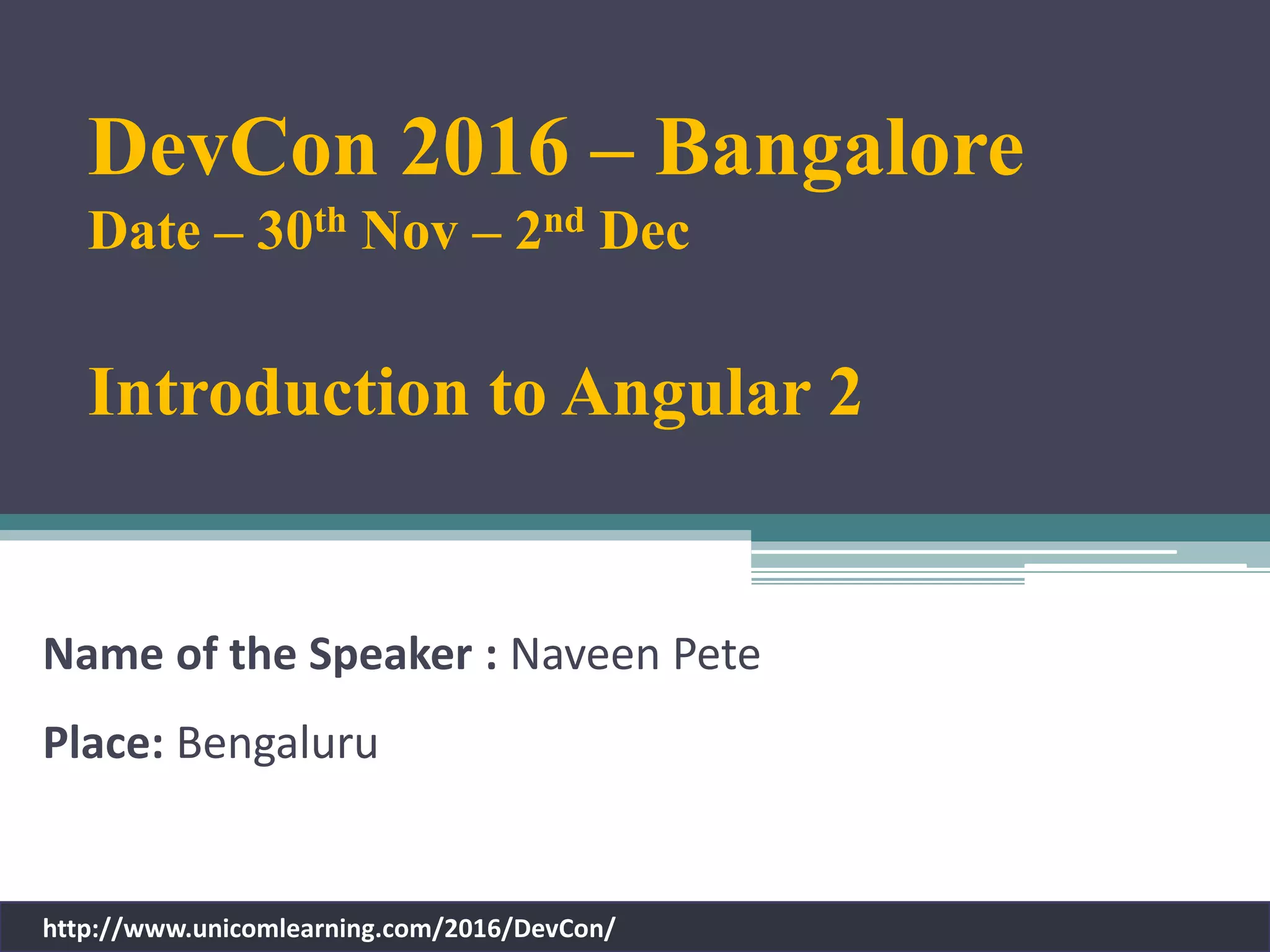
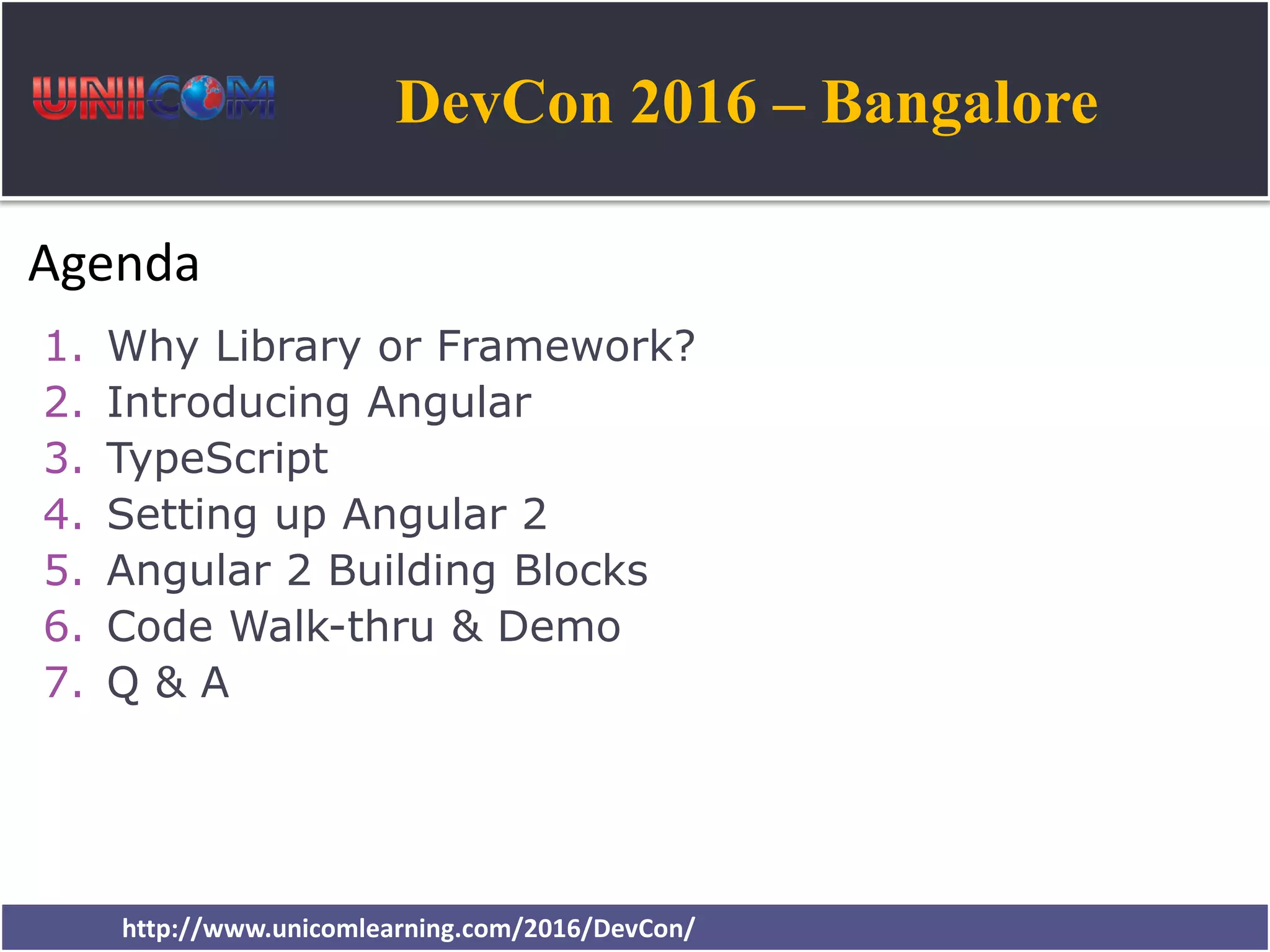

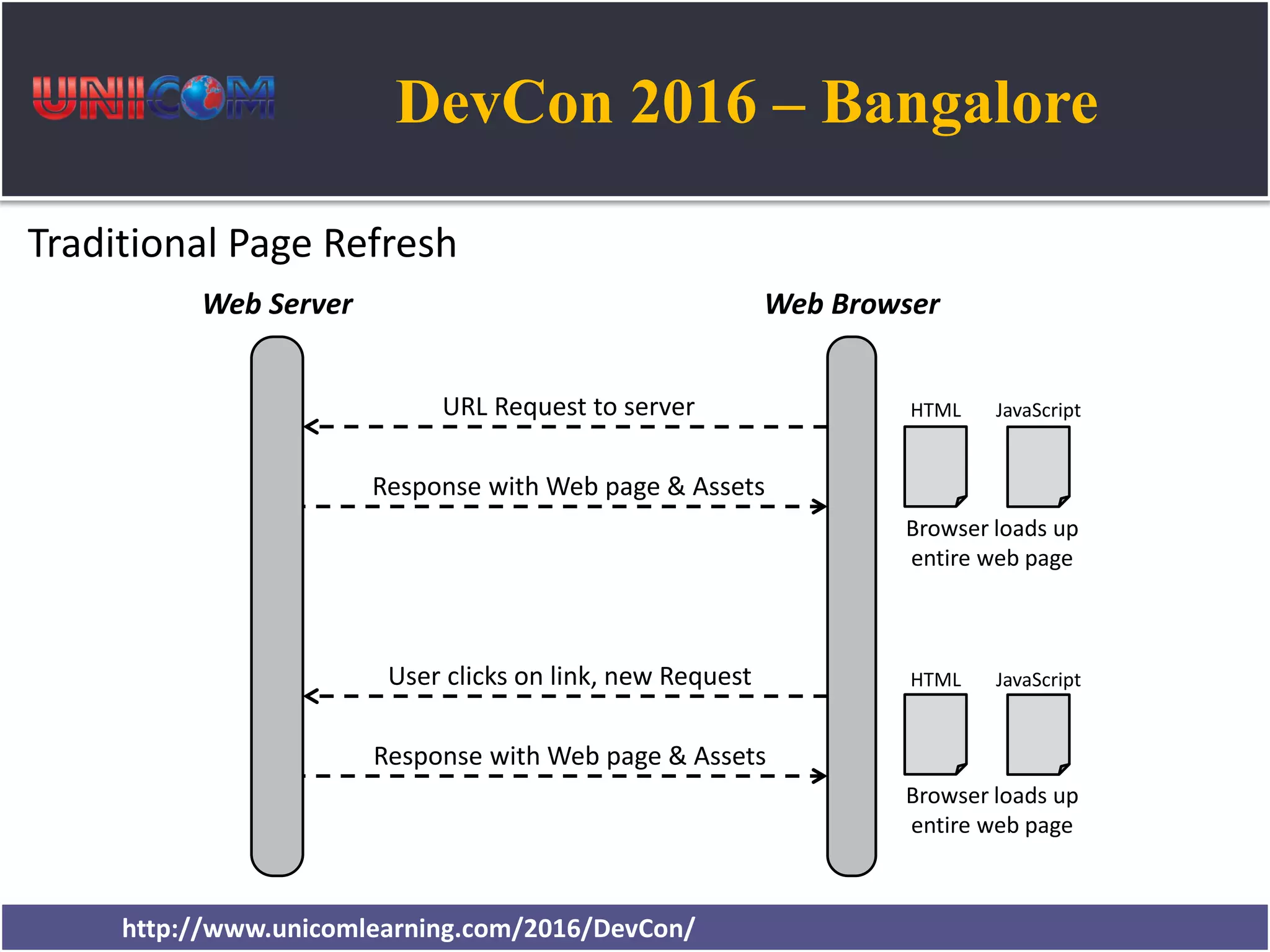
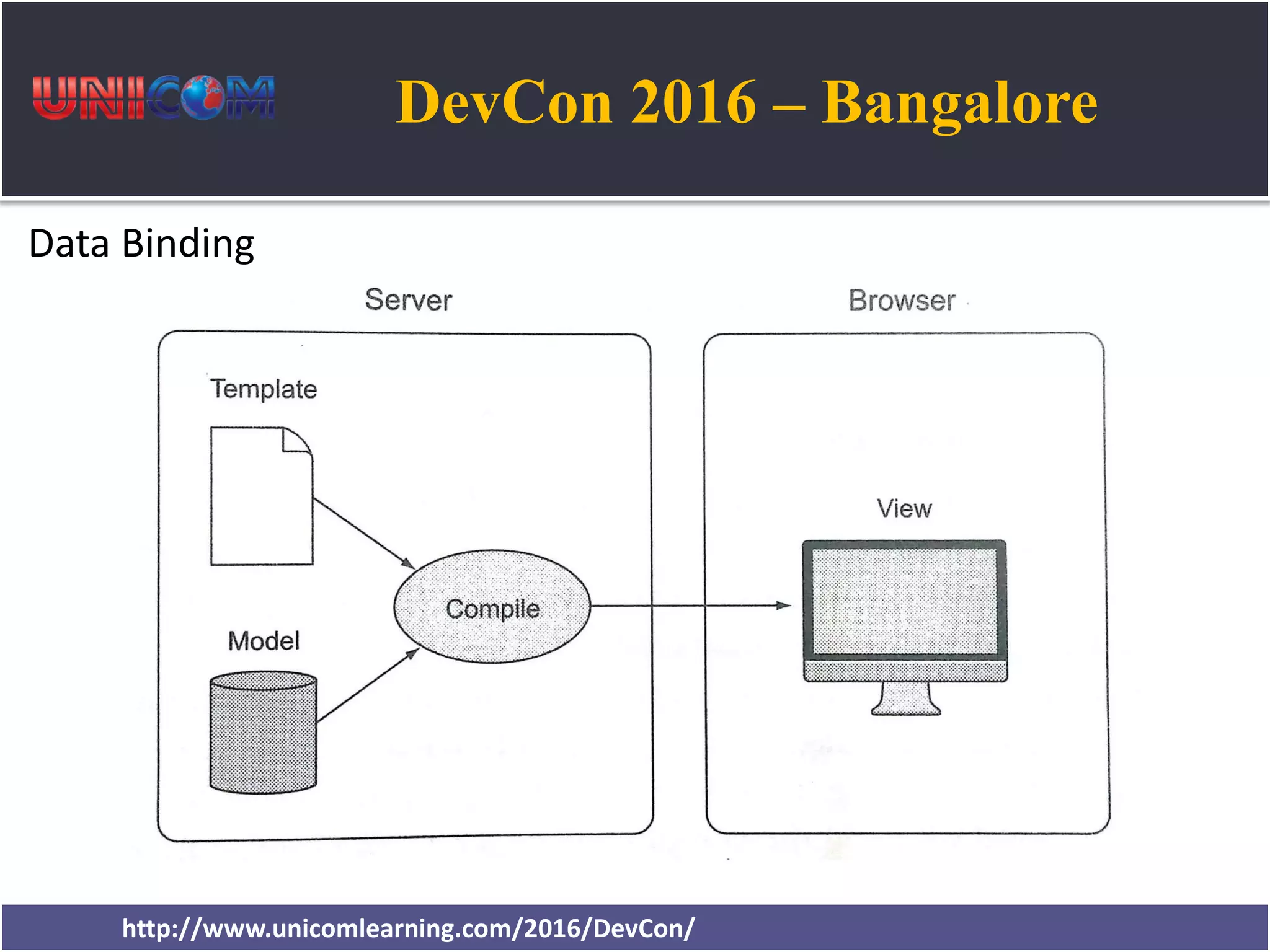
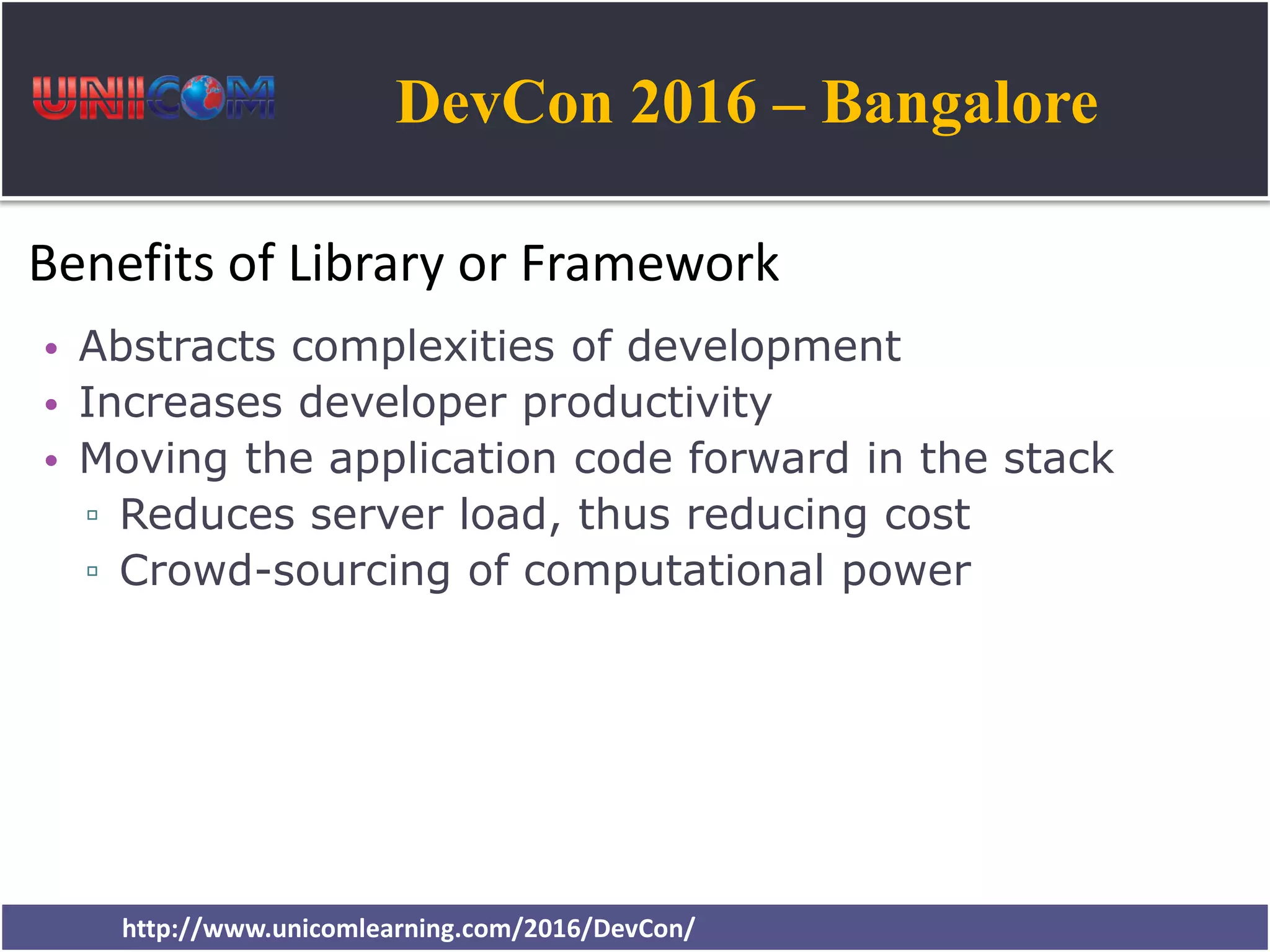
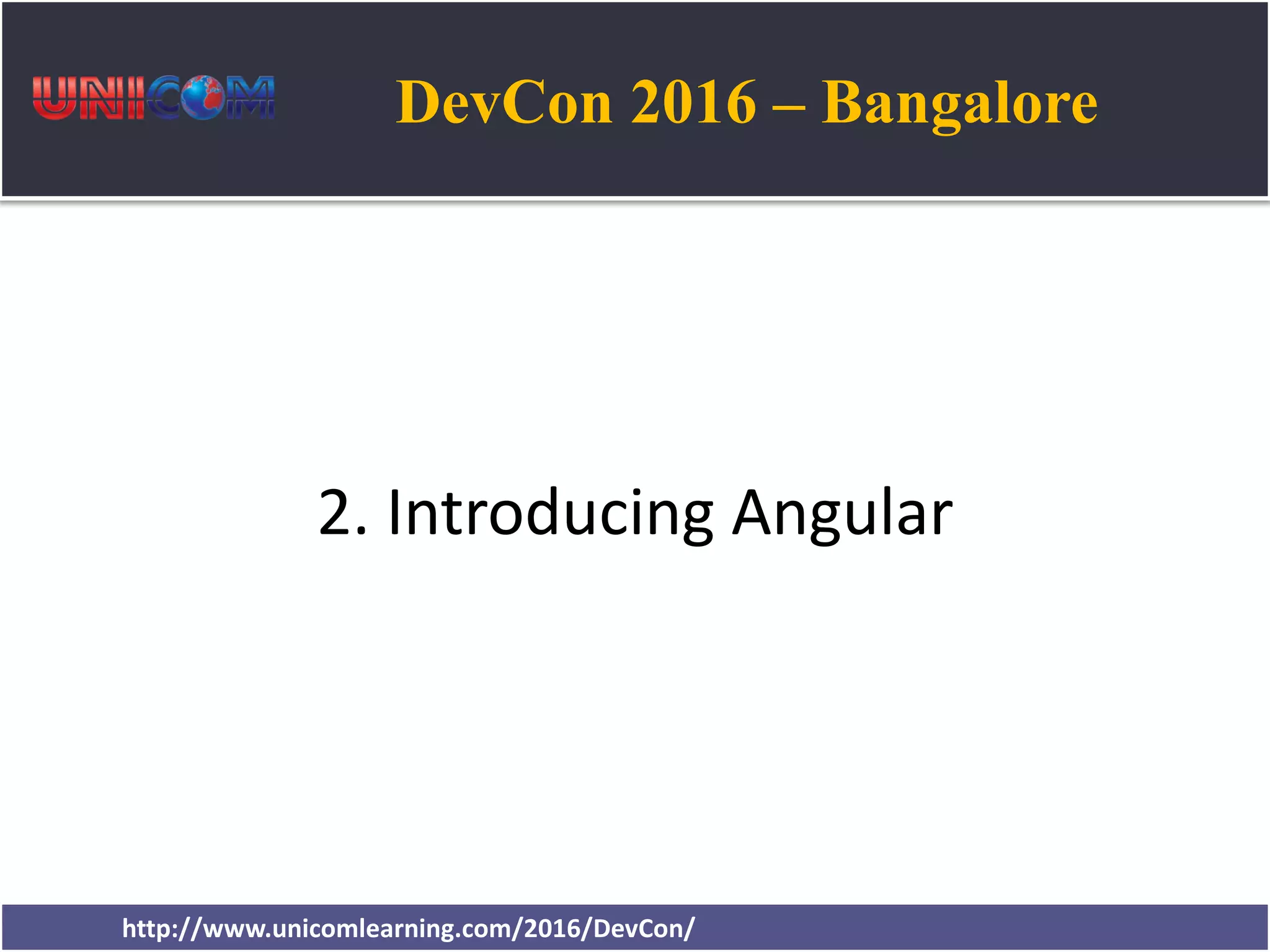
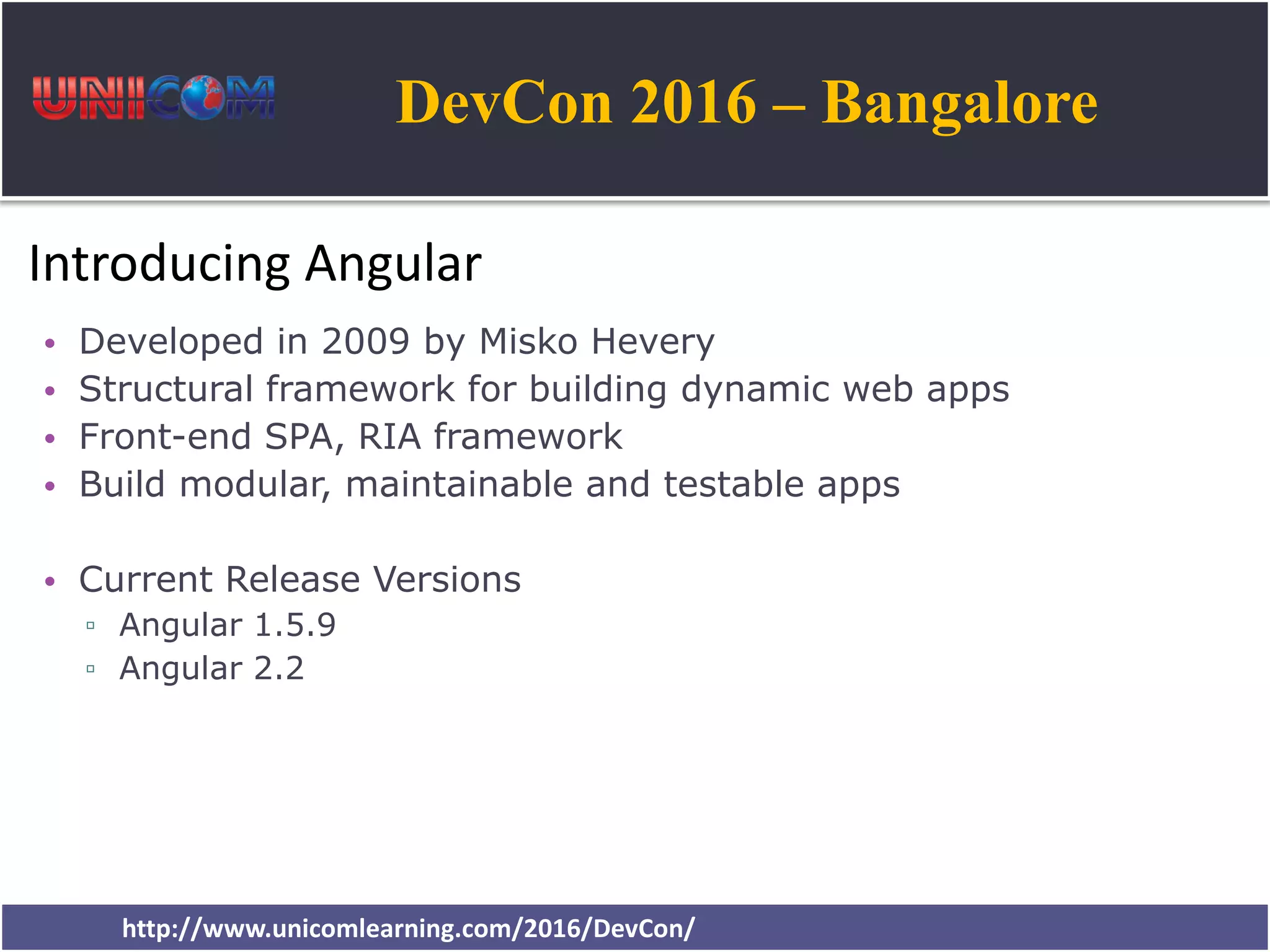
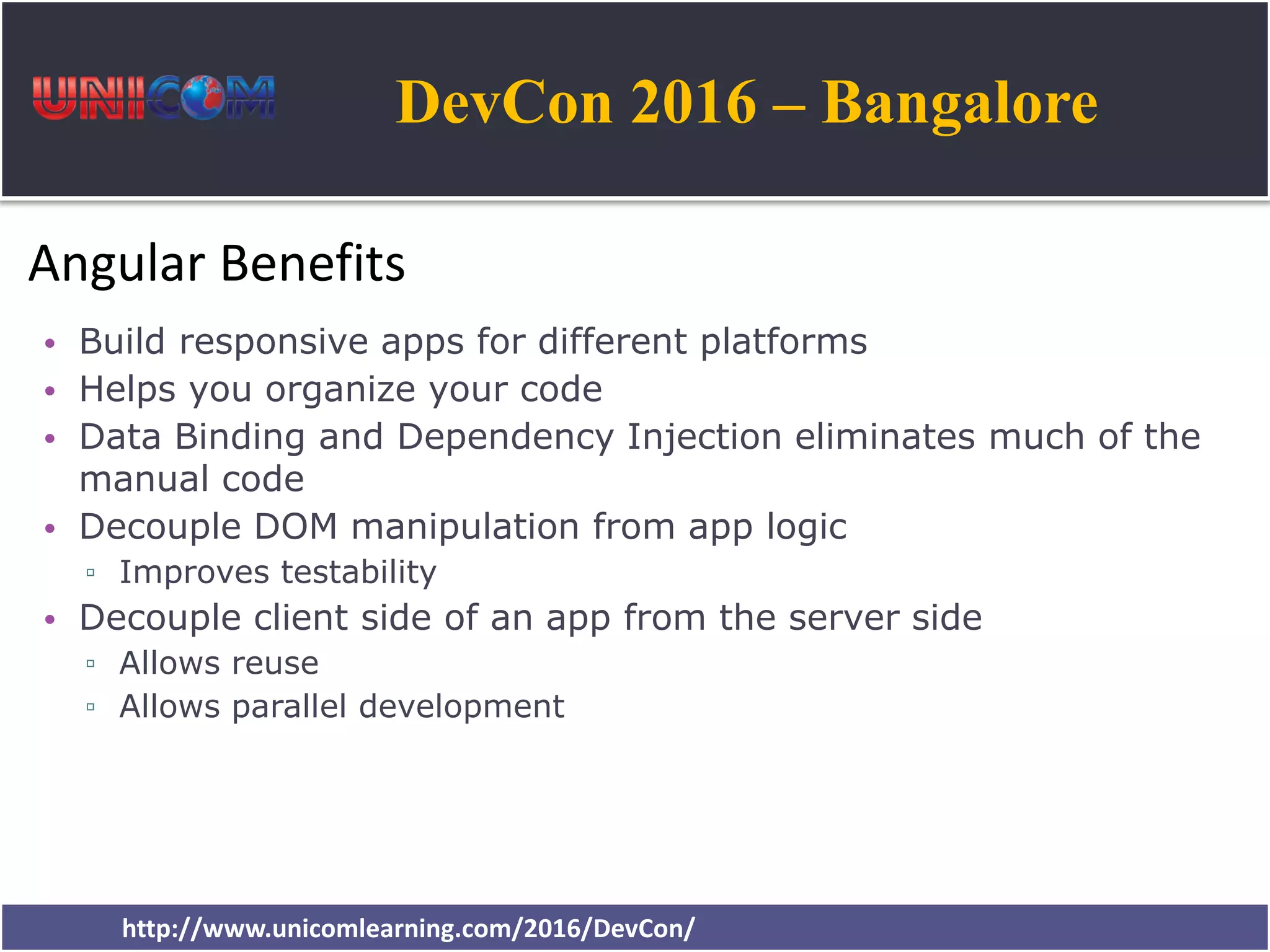
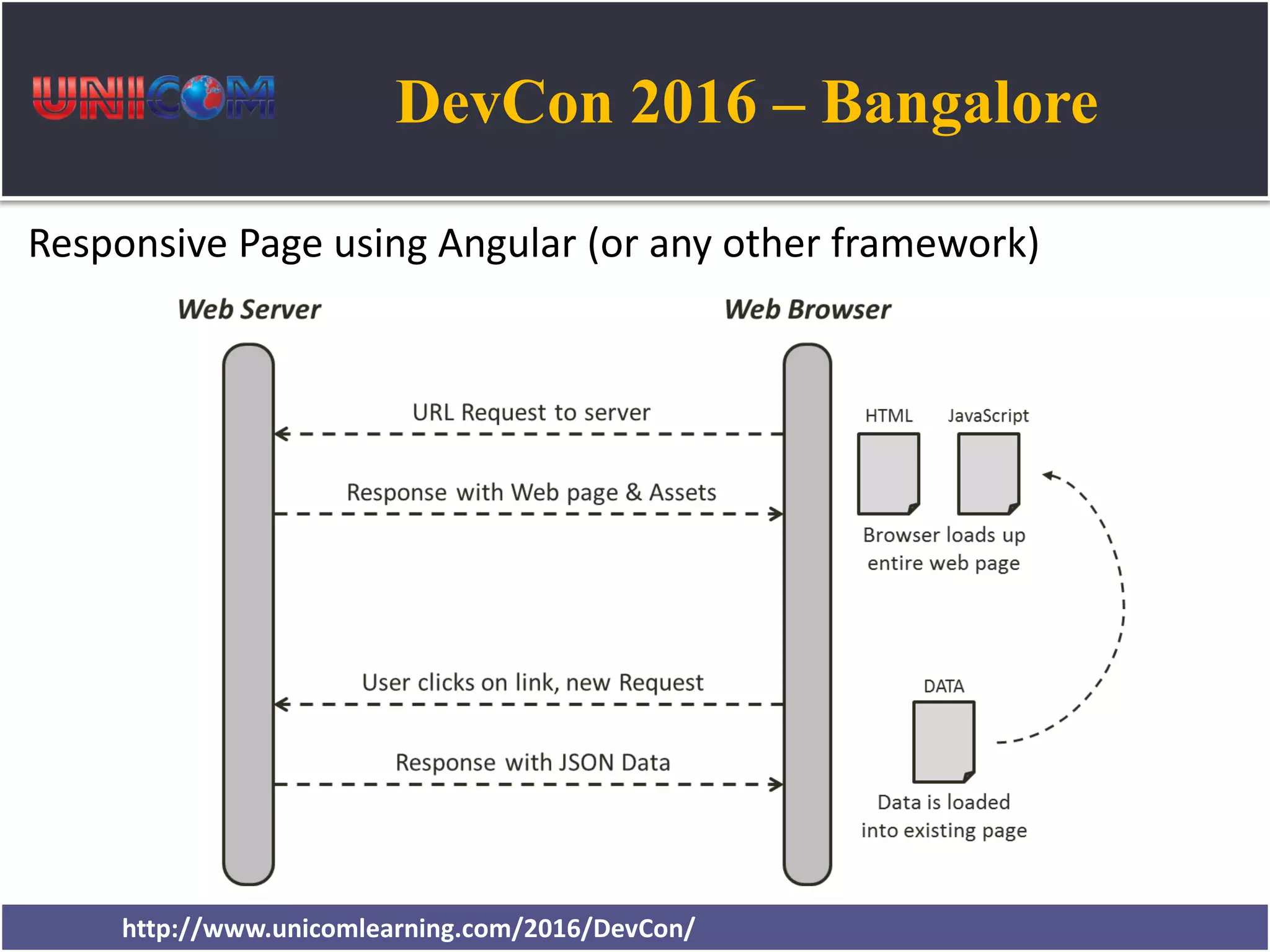
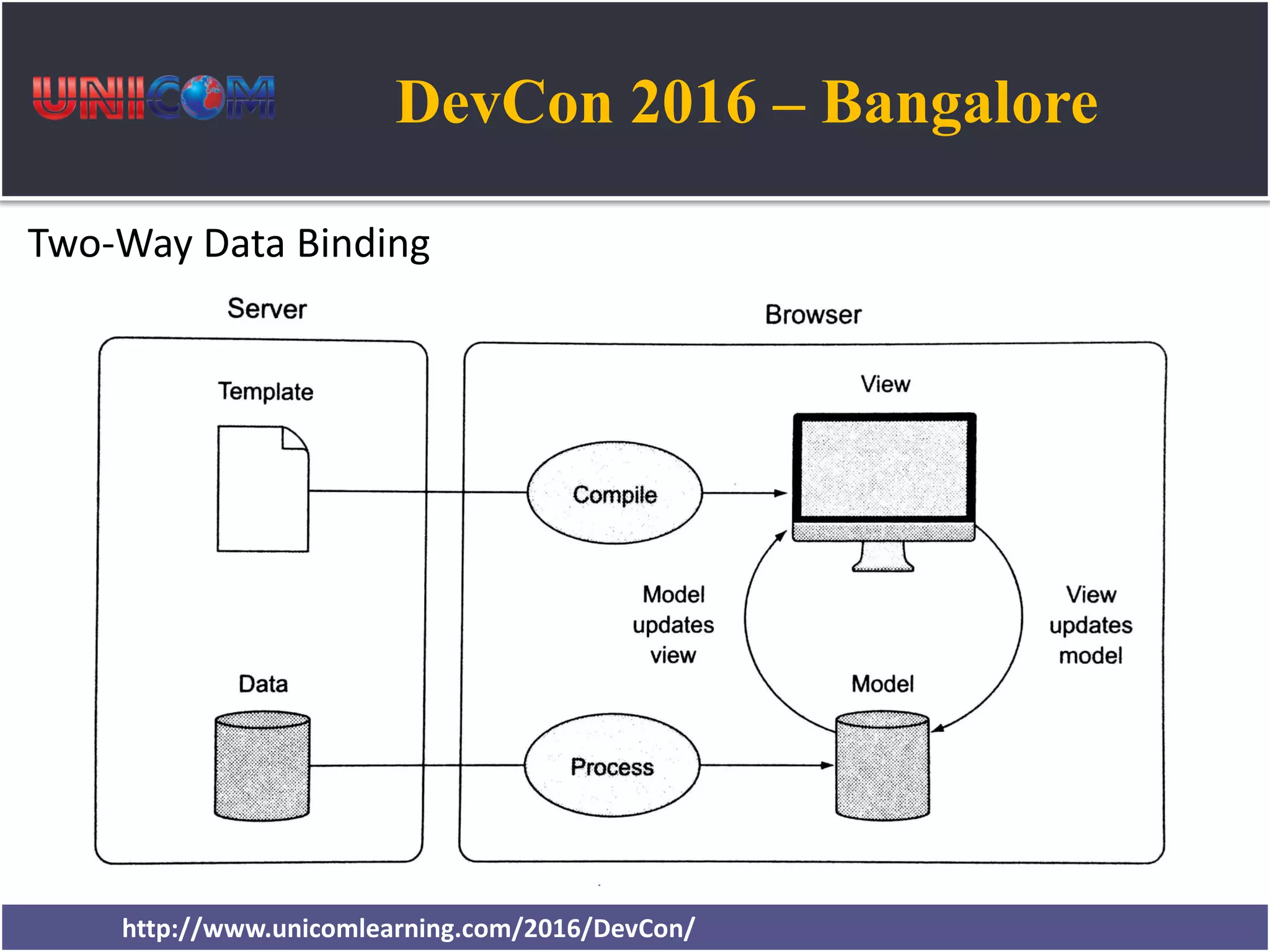
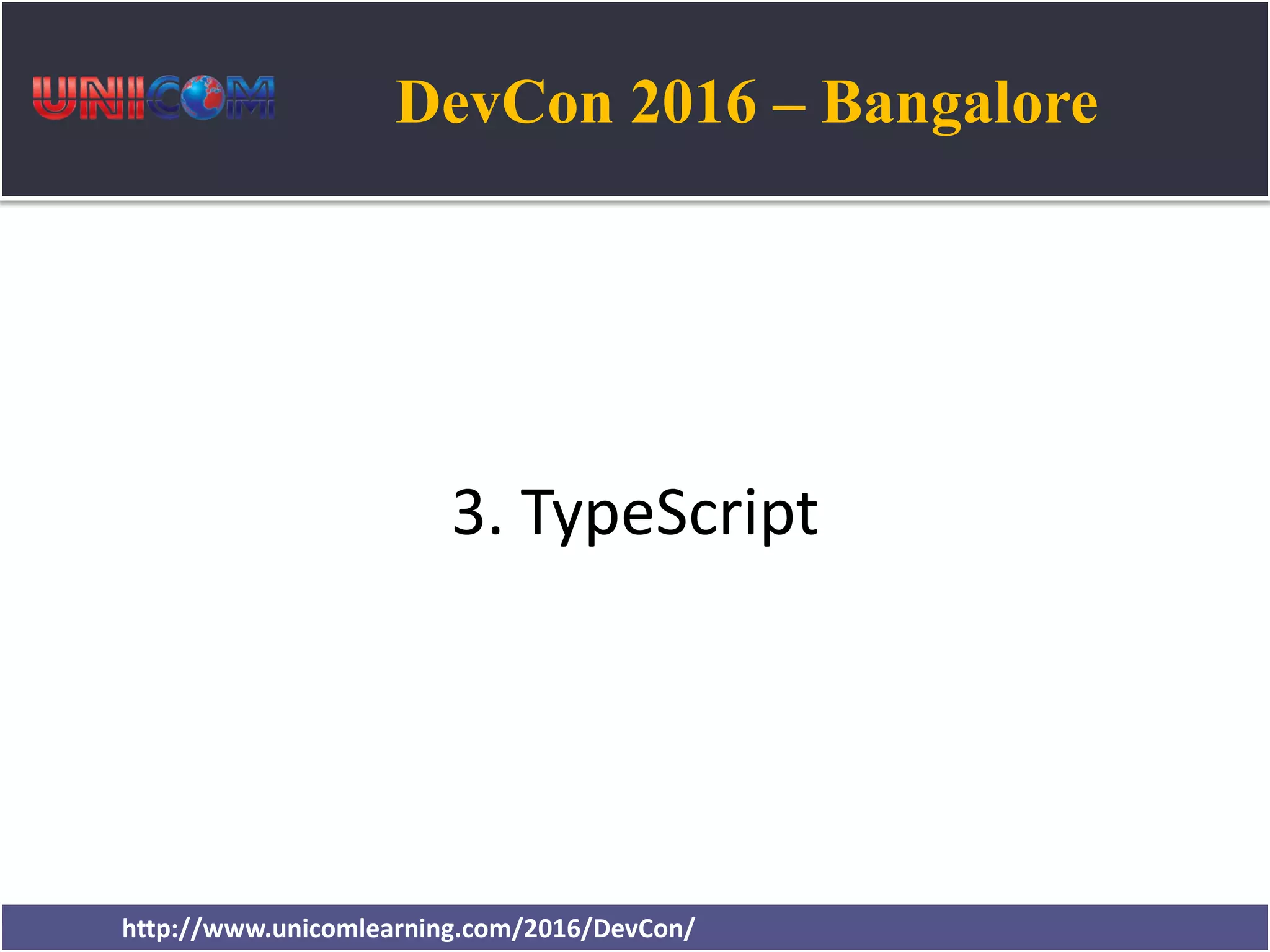
![DevCon 2016 – Bangalore http://www.unicomlearning.com/2016/DevCon/ TypeScript • Superset of JavaScript • Chosen as main language by Angular 2 • By far most documentation & example-base uses TypeScript • Why TypeScript? ▫ Strong Typing reduces compile-time errors, provides IDE support ▫ Next Gen JS Features Modules, Classes, Import, Export, … ▫ Missing JS Features Interfaces, Generics, … Install TypeScript [sudo] npm install –g typescript](https://image.slidesharecdn.com/introduction-to-ng-2-161202023444/75/Introduction-to-Angular-2-13-2048.jpg)
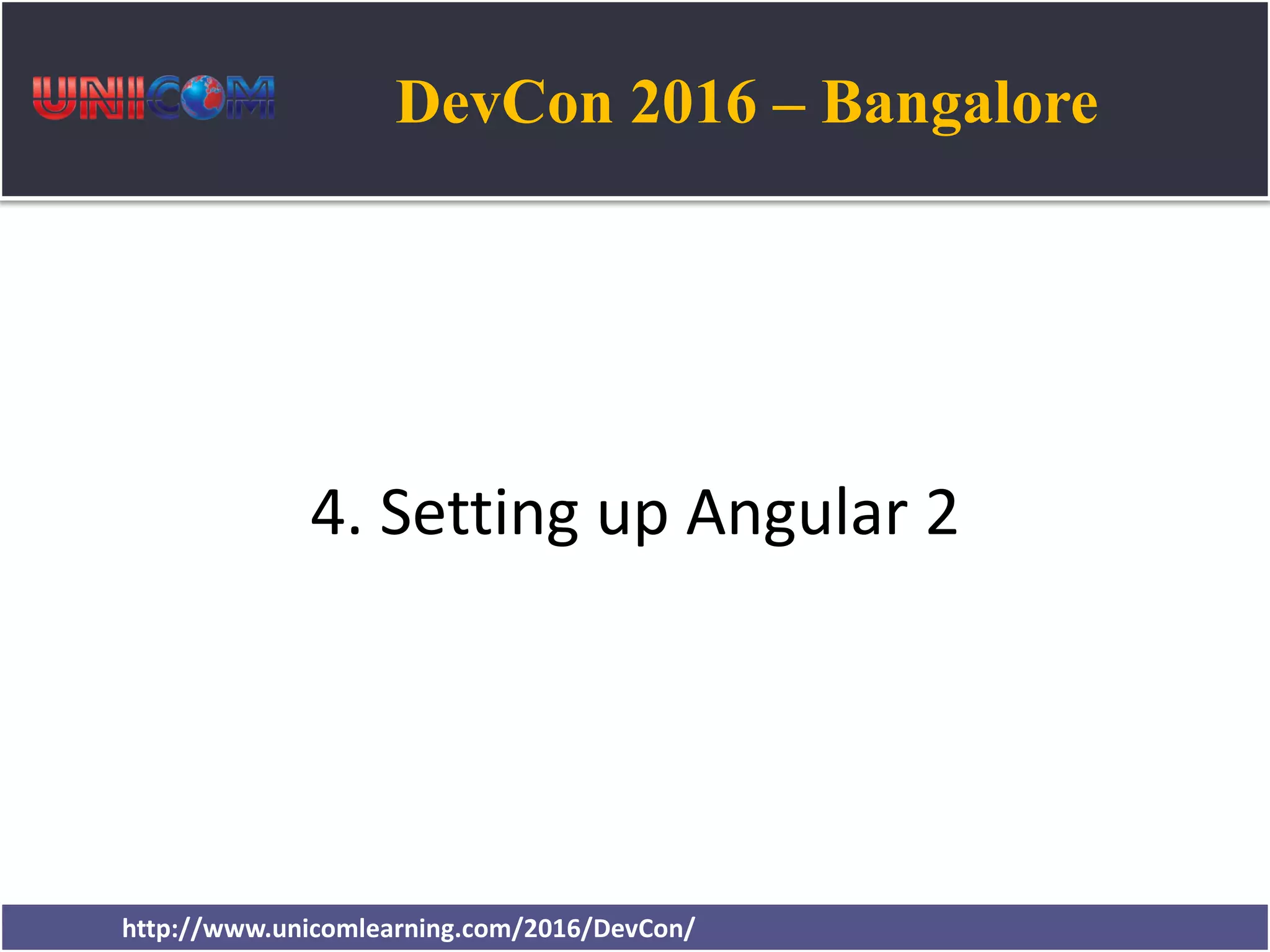
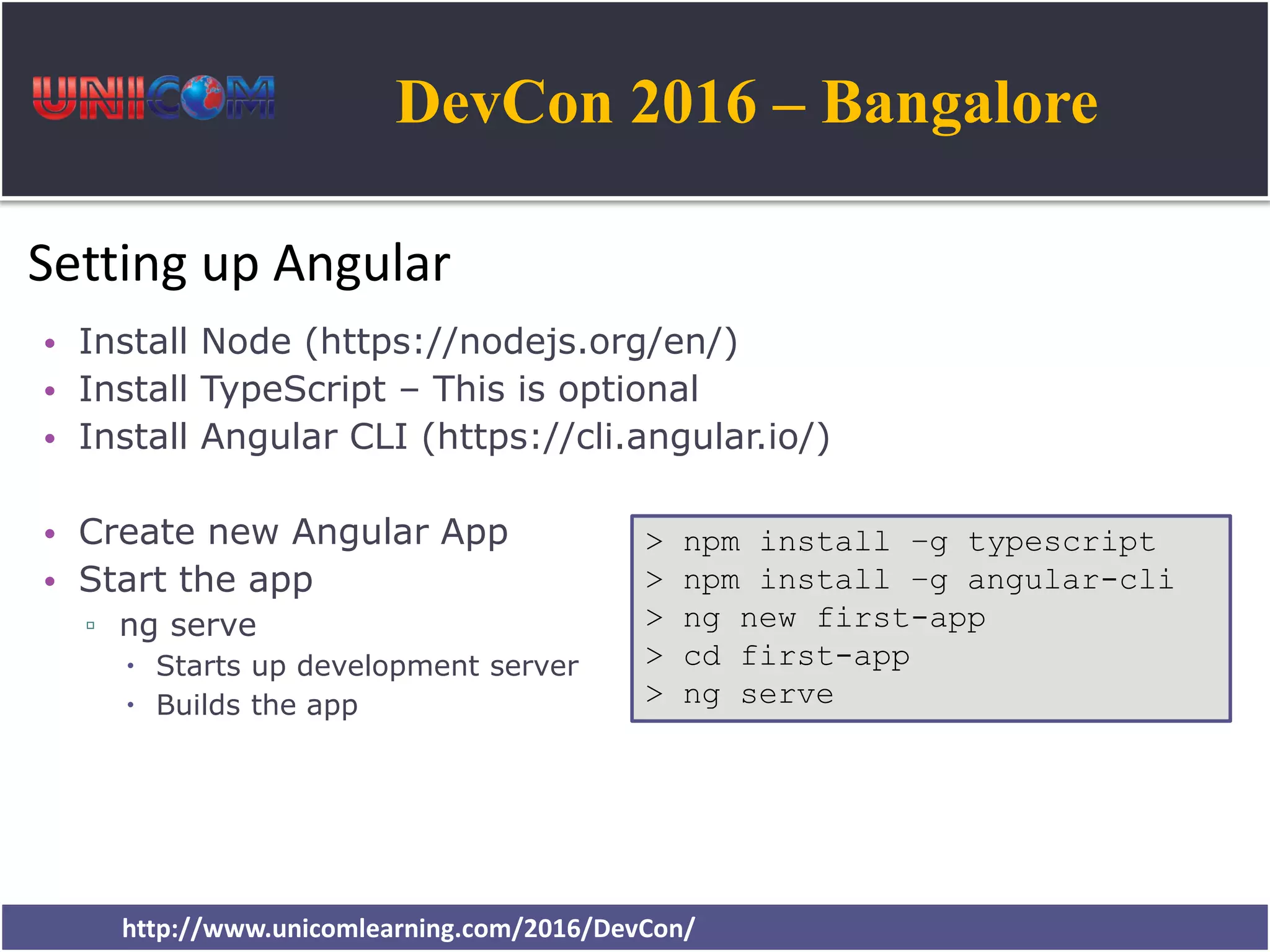
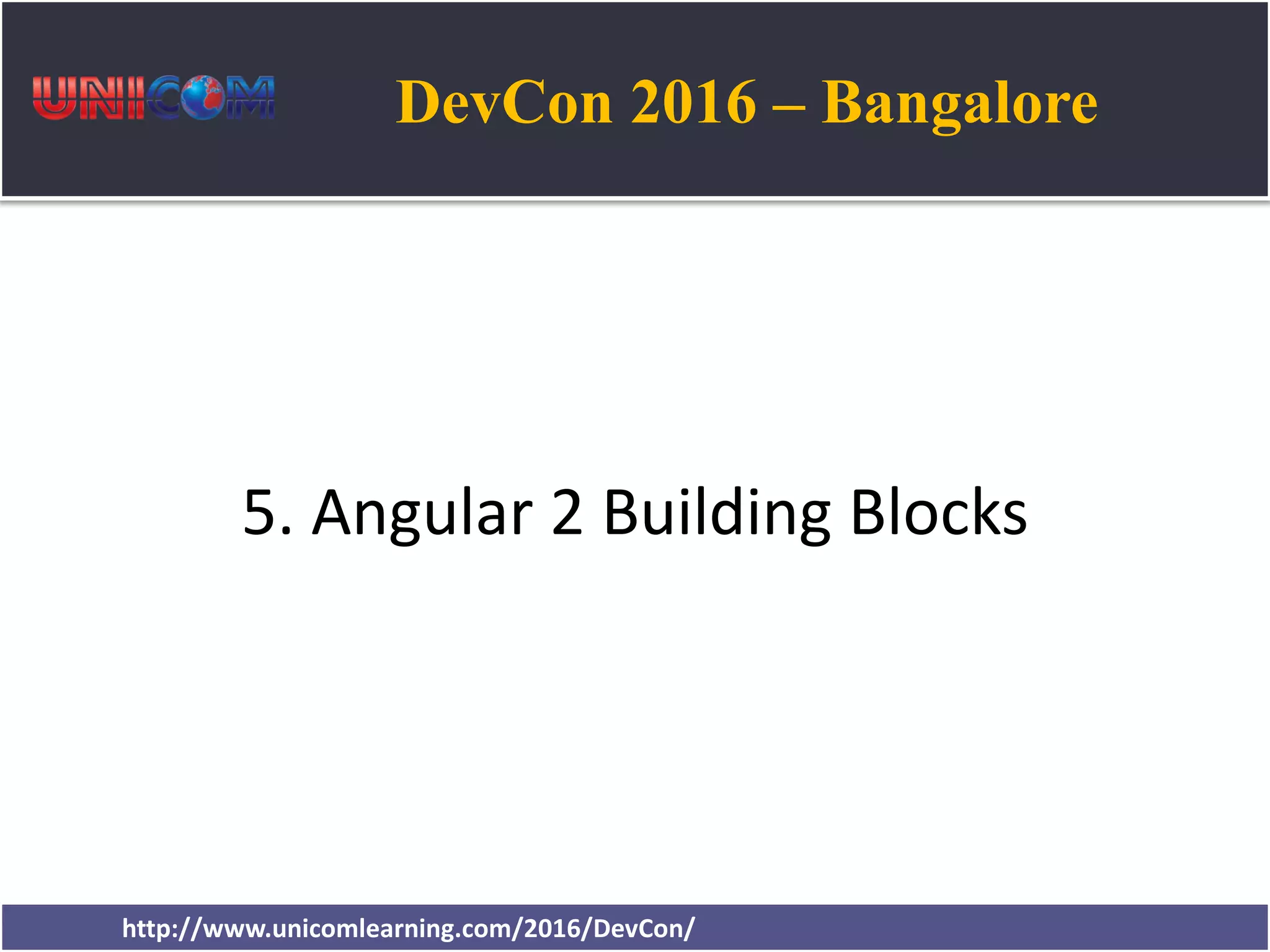
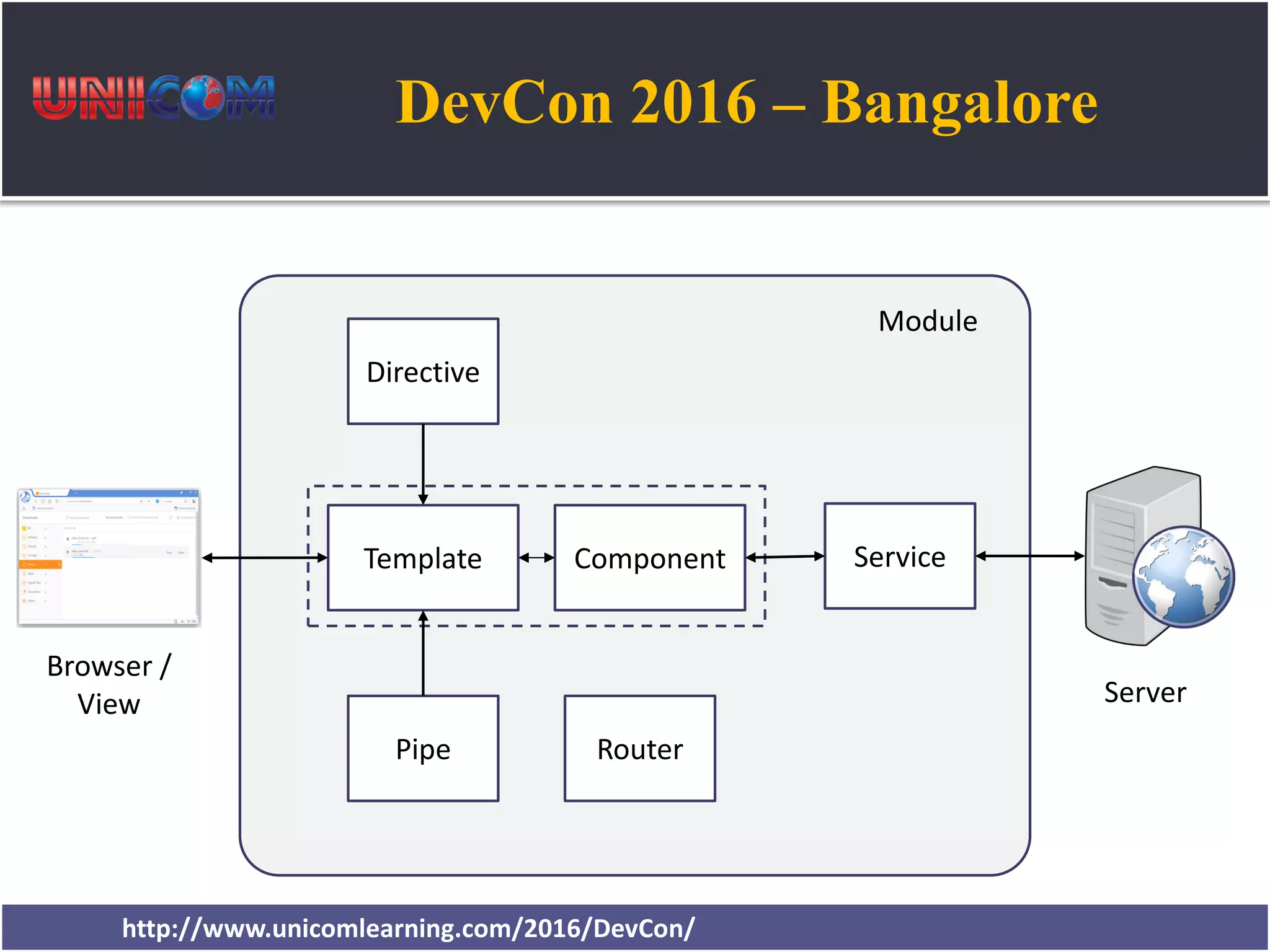
![DevCon 2016 – Bangalore http://www.unicomlearning.com/2016/DevCon/ Module (NgModule) • A block of highly related classes • Organizes an application into cohesive blocks of functionality • Every app has at least one module, called AppModule @NgModule({ imports: [module1, module2, ...], declarations: [ component(s), directive(s), pipe(s), ... ], exports: [class1, class2, ...], providers: [service1, service2, ...] }) export class AppModule{ } AppModule](https://image.slidesharecdn.com/introduction-to-ng-2-161202023444/75/Introduction-to-Angular-2-18-2048.jpg)
![DevCon 2016 – Bangalore http://www.unicomlearning.com/2016/DevCon/ Component • Encapsulates the template, data and the behavior of a view • Every app has at least one component, called AppComponent • Completely decoupled from the DOM @Component({ selector: ‘rating’, templateUrl: ‘./rating.component.html’, styleUrls: [‘./rating.component.css’] }) export class RatingComponent { averageRating: number; setRating(value) { ... } } Creating Component > ng g c product AppComponent HeaderComponent RecipesComponent ShoppingListComponent](https://image.slidesharecdn.com/introduction-to-ng-2-161202023444/75/Introduction-to-Angular-2-19-2048.jpg)
![DevCon 2016 – Bangalore http://www.unicomlearning.com/2016/DevCon/ Template & Data Binding • Defines component’s view • Uses HTML and Angular’s template elements & attributes • Data Binding ▫ Interpolation <h1>{{hero.name}}</h1> ▫ Property binding <img [src]=“heroImageUrl”> ▫ Event binding <li (click)=“selectHero(hero)”></li> ▫ Two-way data binding <input [(ngModel)]="hero.name">](https://image.slidesharecdn.com/introduction-to-ng-2-161202023444/75/Introduction-to-Angular-2-20-2048.jpg)
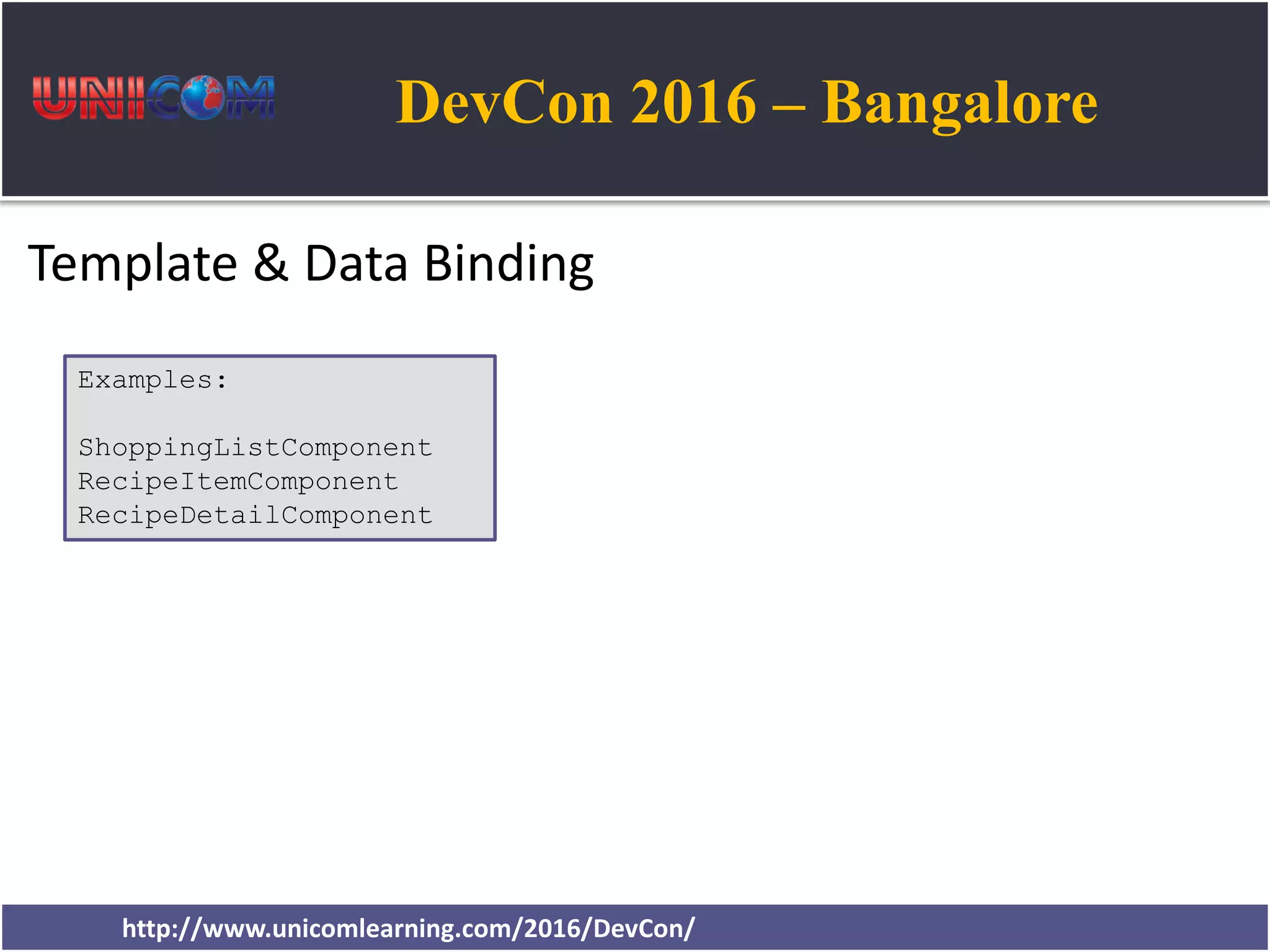
![DevCon 2016 – Bangalore http://www.unicomlearning.com/2016/DevCon/ Directive • Helps you to extend HTML to support dynamic behavior • Transforms the DOM according to instructions given • Can be built-in or custom • Two kinds ▫ Structural – alter the layout. E.g. *ngFor, *ngIf ▫ Attribute – alter the appearance or behavior. E.g. ngModel, ngClass @Directive({ selector: '[appRating]‘ }) export class RatingDirective { ... } Creating Custom Directive > ng g d rating ShoppingListComponent ShoppingListAddComponent](https://image.slidesharecdn.com/introduction-to-ng-2-161202023444/75/Introduction-to-Angular-2-22-2048.jpg)
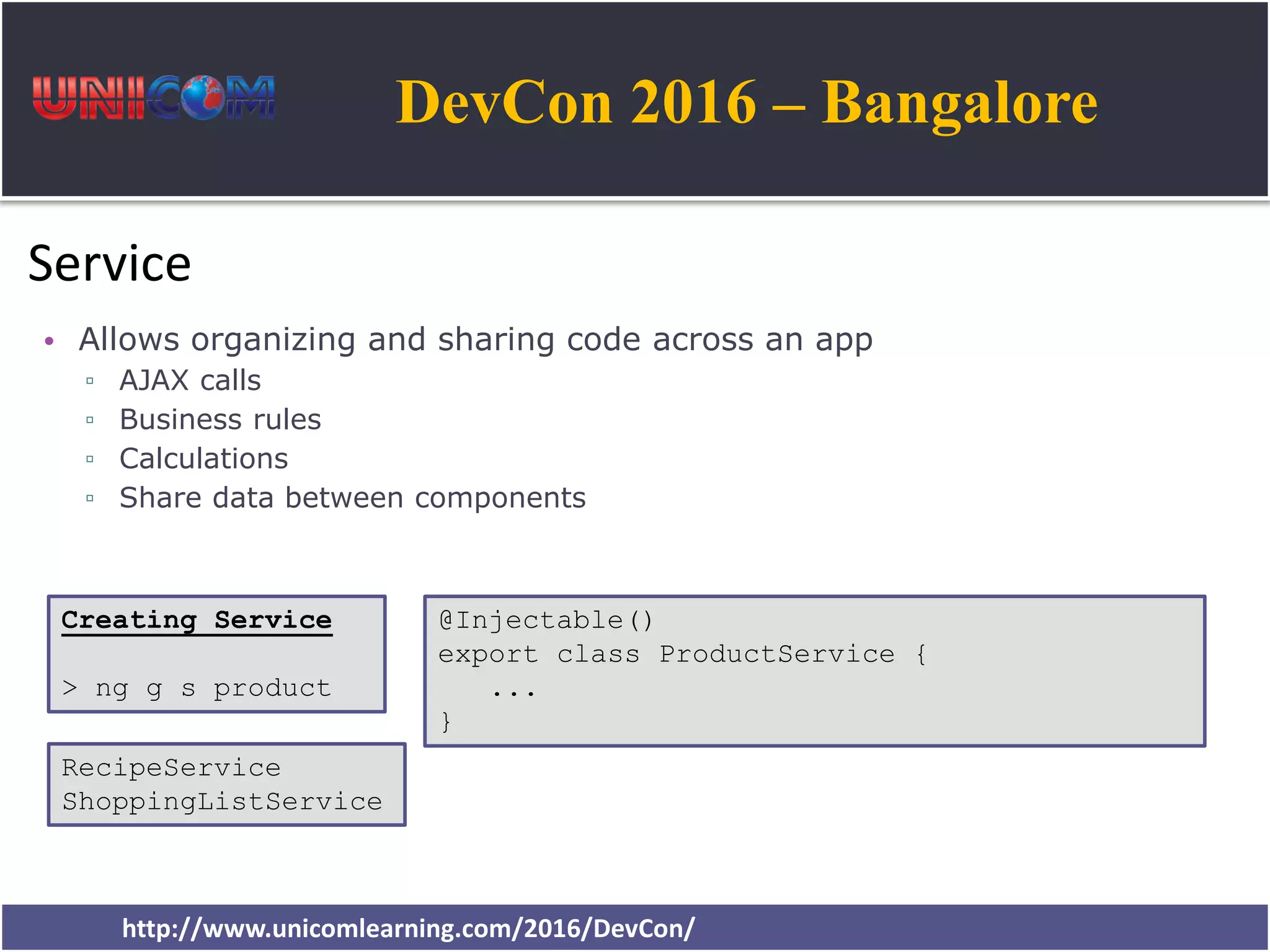
![DevCon 2016 – Bangalore http://www.unicomlearning.com/2016/DevCon/ Dependency Injection • Dependency: An object that can be used (a service) • Injection: Passing of a dependency to a dependent object so that it can use it. The client does not need to build the object • Angular 2 uses constructor injection @Component({ selector: 'rb-recipe-list', templateUrl: './recipe-list.component.html‘, providers: [RecipeService] }) export class RecipeListComponent implements OnInit { constructor(private recipeService: RecipeService) { } } RecipeListComponent ShoppingListComponent](https://image.slidesharecdn.com/introduction-to-ng-2-161202023444/75/Introduction-to-Angular-2-24-2048.jpg)

![DevCon 2016 – Bangalore http://www.unicomlearning.com/2016/DevCon/ Router • Enables navigation from one view to the next as users perform application tasks • Maps a URL path to a component • Steps ▫ Define array of routes using ‘Routes’ ▫ Register routes with router module using ‘Router.forRoot()’ ▫ Add the resulting module to ‘imports’ array of ‘AppModule’ ▫ Add <router-outlet> element to the template ▫ Use ‘routerLink’ attribute directive in <a> tag to navigate to a specific route <a [routerLink]="['/recipes']">Recipes</a> app.routing.ts app.module.ts app.component.html header.component.html recipe-item.component.html recipe-detail.component.ts](https://image.slidesharecdn.com/introduction-to-ng-2-161202023444/75/Introduction-to-Angular-2-26-2048.jpg)
